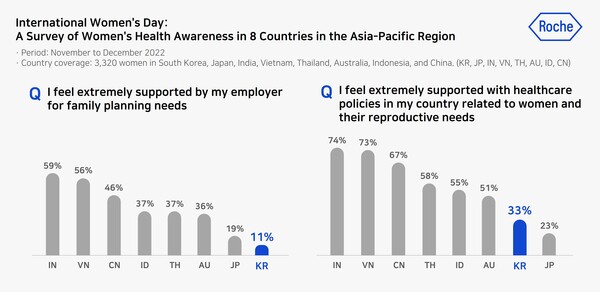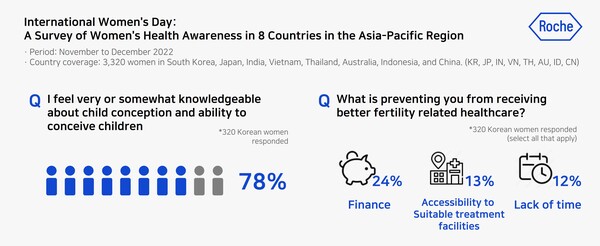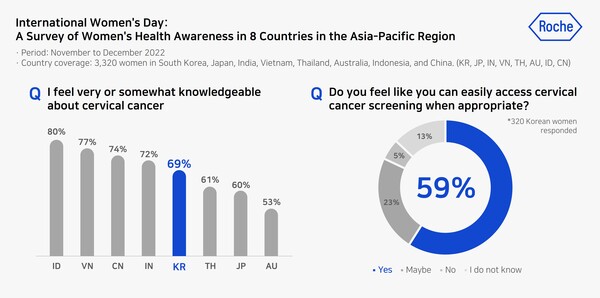Korean women are less likely to feel supported by their employers regarding family planning, including pregnancy, compared to other countries, a survey showed.

Roche Diagnostics released the results of a survey on women's health and self-determination among women in eight countries across the Asia Pacific region on Wednesday, which is International Women's Day.
The eight countries are Korea, Australia, India, Japan, China, Indonesia, Thailand, and Vietnam, and the company surveyed a total of 3,320 women, including 320 from Korea, in each country were surveyed from November to December 2022.

According to the survey, only one in ten (11 percent) of women in the workforce said they could get support for family planning, including pregnancy, from their employer. The percentage was the lowest of the eight countries.
The survey also showed that only 33 percent of Korean responders felt that current healthcare policies support women's health rights, the second lowest of the eight countries.

In the area of pregnancy and fertility treatment awareness, eight in ten (78 percent) respondents said they were very or somewhat knowledgeable about pregnancy and fertility.
However, when asked how many options there are to increase their chances of getting pregnant, only one in ten (10 percent) said a lot, which was the lowest of the eight countries, and a huge difference from Japan (32 percent), which recorded seventh place.
Still, when it came to fertility treatment, nine in 10 (91 percent) said they make their own decisions about whether to seek treatment, recording the highest level of self-determination for fertility treatment among the eight countries surveyed.
Asked what kind of barriers they experience in fertility treatment, Korean women cited financial factors (24 percent), poor access to appropriate healthcare providers (13 percent), and lack of time (12 percent).

The survey also showed that Korean women have a relatively low level of understanding of cervical cancer.
When asked how much they know about cervical cancer, seven in 10 women (69 percent) said they were either very well informed or somewhat informed about cancer.
However, compared to other countries, Korea ranked fifth out of eight, indicating a relatively low understanding of cervical cancer.
Overall, Korean women had relatively low awareness of women's diseases compared to other countries surveyed but had high self-determination regarding treatment and testing.
However, Korean women rated the healthcare system as having relatively low levels of support for women's health rights.
"We hope that this survey of women across eight countries in the Asia-Pacific region on the occasion of International Women's Day will serve as an opportunity for more women to recognize the value and importance of women's health rights," Roche Diagnostics Korea general manager Kit Tang said.
Based on the results of this survey, Roche Diagnostics Korea will continue its efforts to improve the health of women in Korea by providing accurate information on women's diseases and continuing to provide women's health diagnostic solutions to prevent, treat and manage them, Tang added.
Related articles
- 64% of female medical workers experience verbal, physical, and sexual abuses
- Local governments are paying Korean youths to date, to promote marriage, childbirth
- [Women Leaders in K-Bio] Women need to be bolder in biotech: Matica CEO
- [Women Leaders in K-Bio] Leadership ‘behind the curtains’ important: IVI’s Deputy Director General

